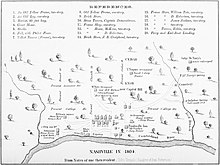|
Joseph Coleman (Tennessee politician)
 Joseph Coleman (d. 1819) was an early settler of Tennessee, United States. He became the first mayor of Nashville,[1] and also served as a trustee of the college that later became the University of Nashville.[2]  BiographyColeman was probably originally from Virginia but came to Tennessee at an early day.[3] He was on a committee of five formed at Nashville in 1799 "to arrange for the building of a stone court-house, to take the place of the log one. What a quaint picture it would present to us now, it we could see the log cabin as it then stood in the centre of the square, with hitching posts around, to which were tied the horses of those who were attending court. Here, too, on a Saturday, were various sales made at the courthouse door. Negroes were sold and real estate and cattle. From what I can glean I think a regular cattle show occurred here weekly."[4] There were about 400 people in Nashville in 1804, and the village was incorporated in 1806 with a mayor and six aldermen.[5] The electorate at that time was solely property owners.[6] Coleman served as mayor 1806 to 1809.[7] One of his acts as mayor was offering a $100 reward for information regarding an incendiary (arsonist) who had allegedly tried to burn down the town.[8] He built three different houses in Nashville over the course of his residency in the town.[2] He was also involved in horse racing and horse breeding. According to a history of thoroughbreds in Tennessee, "Joseph Coleman and associates brought Royalist, bred by the Prince of Wales, to Nashville in 1807. Royalist was the paternal grandsire of the famous American foundation mare, Lady Grey. She was Vandal's fourth dam and Kentucky's immortal Lexington's third dam. Royalist died in Williamson County in 1814. Royalist is the earliest known Tennessee name in current pedigrees."[9] From 1810 to 1812 he was partners with future U.S. president Andrew Jackson and a third man, Horace Green, in a business that traded in cotton, tobacco, and slaves.[10] During the fiercely contested 1828 U.S. presidential election a man named John Lucas wrote a letter sharing his knowledge of the Jackson–Coleman–Green partnership:[3]
 Another man named John Smith wrote that Jackson was also the security on a cotton investment made by Coleman, but he had never heard that they were partners and he thought that Jackson had never met the slaves in question until he had to go fetch them from Natchez, at which time he was afraid "an attachment would be laid in Philadelphia, on the cotton and tobacco" and because he had a lien on the cargo.[11] Andrew Erwin countered that he had seen bank records stating that "A. Jackson's proportion of cash for negroes bought of Richard Epperson" was US$929.45 (equivalent to $18,106 in 2023).[12] There was a related dispute about who legally owned an enslaved man named John Amp, whom Jackson had armed to serve as an enforcer contra Choctaw agent Silas Dismore—Robert Weakley claimed to have "raised" John Amp, but was he the property of Jackson, Coleman, or Jackson ally and Weakley's son-in-law John Brahan, later a leading figure in the early history of Huntsville, Alabama?[13] Coleman died February 19, 1819, while visiting Huntsville in the Alabama Territory.[7] See alsoReferences
|
